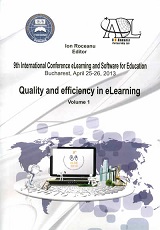AN ANALYSIS OF THE EFFECTIVENESS OF E-LEARNING IN CORPORATE TRAINING PROGRAMS
AN ANALYSIS OF THE EFFECTIVENESS OF E-LEARNING IN CORPORATE TRAINING PROGRAMS
Author(s): Husni Hamad Almistarihi, Abdulaziz AlraddadiSubject(s): Education
Published by: Carol I National Defence University Publishing House
Keywords: e-Learning; Course contents; e-Learning quality; effectiveness
Summary/Abstract: There is a disagreement that traditional learning is the best way of maintaining a learning process. Other models are always considered to be lower or less efficient. There is no finding to support this argument, and research shows that e-Learning models are at least as good as traditional learning or may be better than traditional classroom if e-Learning can be used in an efficient manner. Most corporations are constantly looking for less cost methods to deliver training to their participants with possible maximum quality. E-learning is less expensive than traditional classroom instruction, but the quality to deliver training in e-Learning may be degraded in some cases according to some issues. In this study we found that the most issues influence e-Learning quality is the course nature. Some courses nature may have special contents that require the existence of instructor in the classroom. Therefore, achieving both of the two objectives namely, cost and quality in e-Learning is not an easy task since the two objectives are conflicting to each other. Indeed, selecting e-learning or traditional classroom or mixed of them as an education method should be based on some criteria. An investigation and analysis is made in order to discover these criteria in order to deliver training in an optimized cost and quality. The analysis and investigation results the most criterion influence the way to select education method is the course contents, and an effective guideline is recommended for applying the suitable education method in order to improve quality in e-Learning with possible minimized cost.
Journal: Conference proceedings of »eLearning and Software for Education« (eLSE)
- Issue Year: 9/2013
- Issue No: 01
- Page Range: 476-479
- Page Count: 4
- Language: English

